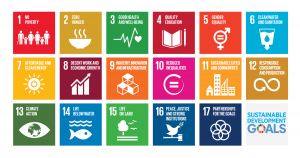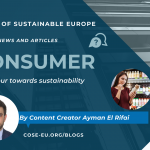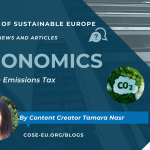Written by: Ayman El Rifai
Reading time: 3 minutes
Sustainable Development in Developing Countries
The topic of sustainability has emerged as a crucial issue that needs to be instantly faced and solved by the world’s nations. International organizations have set different objectives for countries to follow in order to achieve sustainability and fight crises such as climate change and social inequality. The United Nations, for example, has set an urgent Agenda for Sustainable Development for all countries to follow which is made up of 17 sections, named the Sustainable Development Goals, these goals need to be achieved by 2030. These SDGs aim for the end of poverty and hunger, the enhancement of people’s well-being and education, the accessibility to clean water and sanitation, and other objectives that lead to the spread of peace of prosperity among the world’s different populations.
Following the creation of this Agenda, the European Union showed a remarkable commitment to the implementation of the 17 SDGs by including them in its policies and initiatives as well as following up and reporting their progress. For example, the European Commission created the EU Green Bonds Standard (GBS) in 2019 to encourage investors to take part in green projects and sustainable initiatives. In addition to that, in the European Green Deal, the Commission planned to fund similar projects with more than a trillion euros and decided to always consider sustainability when making investment decisions.

Sustainable Development Goals (SDG’s)
Challenges of Sustainable Development in Developing Nations
One of the major challenges that different communities face when adopting sustainable development is the confusion of metric devising. Some terms like sustainability and efficiency should be clearly defined and explained in order to be able to set achievable and measurable targets that can be monitored. By monitoring their performance in sustainable development projects, nations are able to collect data that could be used in further research which will, in return, enhance the performance and accelerate the procedure of reaching the SDGs. In developing nations, some terms might be unfamiliar to the local communities due to the lack of awareness towards the topic of sustainability, but the communication and collection of information are also challenging due to the fragmentation or even lack of data. Most developing countries suffer from low statistical abilities and cannot respond to the SDGs’ growing demand for data. For example, in the Middle East, there is a regional deficit in data related to the performance of the human resources department when it comes to the recruiting, retaining, and promoting processes, making it difficult to track the region’s performance in achieving SDG number 5, which is gender equality.
Another challenge that many developing countries face when attempting to implement sustainable development is the absence of reliable infrastructure and even lack of policies that have to do with infrastructure. These nations are thus unable to accomplish the SDGs since they lack the developed infrastructure needed to support the use of internet, networking, computing, as well as the database management system. In fact, the listed elements are highly important and much needed in scientific research, nature control, successful planning, as well as decision making. Furthermore, receiving mapping data to manage and monitor disasters is also challenging third world nations due to their high cost, absence of methods to observe the ground, or even natural reasons like the struggling to access mountainous regions. For example, in the Philippines, unreliable infrastructure is considered to be a major limitation to the nation’s goal of expanding its economy and reducing poverty, SDGs number 8 and 1 respectively. Even though it has enough control of water and electricity, the country struggles from a poor business environment as well as poor planning and cooperating capabilities.
Another issue most developing countries face is the lack of access to enhanced cooking energy technologies, which has to do with each nation’s socio-economic and technical limitations. These barriers are restricting the improvement of the communities’ quality of life and creating a vicious circle of poor economic development, causing low access to reliable energy services. This circle could be broken by creating energy policies related to income generation from efficient energy activities. If not, SDG number 7 (providing Affordable and Clean Energy) might never be achieved, leaving many communities across the world dependent on standard biomass energy. That is the case for the majority of the people living in Sub-Saharan Africa, where women spend up to four hours a day collecting firewood instead of investing their time in education or other economic activities (SDGs number 4 and 5, Quality Education and Gender Equality respectively).
The Future of Sustainable Development in Developing Countries
We cannot expect developing countries to achieve sustainability as easily as developed countries. Rather, we should see sustainable development as a way to understand factors such as poverty and rapid urbanization which indicate whether economic development is possible or not. For that reason, when aiming to achieve the SDGs, organizations should be aware of the fact that factors like poverty and rapid urbanization are still very common in the developing and underdeveloped parts of the world. One way to achieve sustainable development in these countries is by first setting policies to enhance the living conditions of the least fortunate for them to later be able to take care of their environment. If such policies are not implemented in the near future, then not only will the efforts to achieve sustainability fail, but we might also expect poverty to increase in many parts of the world.
 “Ayman El Rifai is our content creator from Lebanon with a Bachelor’s degree in Business Administration from the American University of Beirut. He joined Circle of Sustainable Europe (CoSE) because he believes in the importance of adopting a sustainable approach in our everyday activities and on the corporate and governmental levels.”
“Ayman El Rifai is our content creator from Lebanon with a Bachelor’s degree in Business Administration from the American University of Beirut. He joined Circle of Sustainable Europe (CoSE) because he believes in the importance of adopting a sustainable approach in our everyday activities and on the corporate and governmental levels.”
References:


